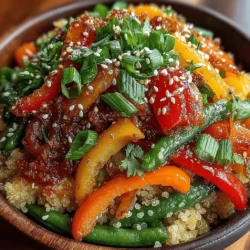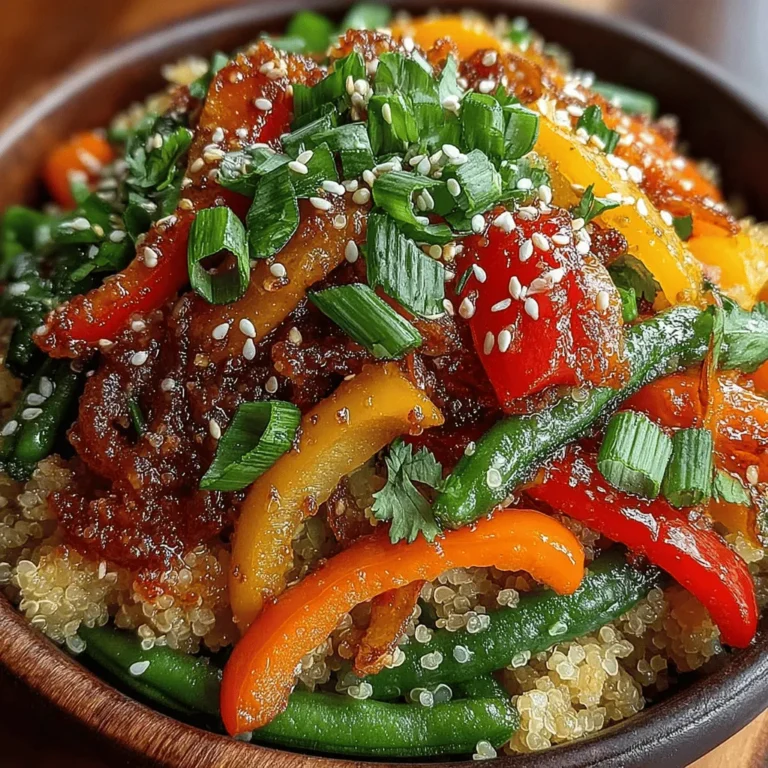Cauliflower Rice Stir-Fry Delight: A Flavorful and Healthy Recipe
In recent years, cauliflower rice has surged in popularity, becoming a staple in kitchens that prioritize healthy eating and low-carb diets. This versatile ingredient serves as an excellent substitute for traditional rice, appealing to both health-conscious individuals and those looking to incorporate more vegetables into their meals. Whether you are on a keto diet, trying to reduce carbohydrate intake, or simply seeking to eat more nutritious meals, cauliflower rice offers a light, flavorful alternative that doesn’t compromise on taste or satisfaction.
Stir-fry dishes, on the other hand, have long been celebrated for their convenience and adaptability. They allow home cooks to combine a variety of colorful vegetables, proteins, and sauces into a single, quick-cooking meal. The beauty of stir-frying lies not only in the speed of preparation—most dishes can be completed in under 30 minutes—but also in the ability to customize each meal according to personal preferences and available ingredients. With the addition of cauliflower rice, the beloved stir-fry transforms into a nutritious and exciting dish that is sure to please everyone at the table.
This Cauliflower Rice Stir-Fry Delight encapsulates the essence of healthy eating without sacrificing flavor. Packed with vibrant vegetables and infused with aromatic spices, this dish is a feast for the senses. Whether you are a seasoned cook or a novice in the kitchen, this recipe is straightforward and can easily be prepared on a busy weeknight.
Understanding Cauliflower Rice
Before diving into the cooking process, it’s essential to understand what cauliflower rice is and why it has gained such a devoted following. Cauliflower rice is simply cauliflower that has been finely chopped or processed to resemble the texture of traditional rice. This clever transformation allows you to enjoy a familiar side dish while significantly reducing the calories and carbohydrates typically associated with regular rice.
When comparing cauliflower rice to traditional white rice, the nutritional differences are striking. A one-cup serving of cooked white rice contains approximately 200 calories and 45 grams of carbohydrates, while the same serving of cauliflower rice provides just about 25 calories and 5 grams of carbohydrates. Not only does cauliflower rice help lower calorie intake, but it also packs a punch in terms of vitamins and minerals. Rich in vitamin C, vitamin K, and dietary fiber, cauliflower supports digestive health and contributes to overall wellness.
Choosing the right cauliflower is crucial for achieving the best flavor and texture in your dish. Fresh cauliflower should be firm, with tightly packed florets and vibrant green leaves. Look for heads that are free from blemishes or brown spots. If you’re short on time or prefer convenience, pre-packaged cauliflower rice is widely available in grocery stores. However, be sure to check the ingredient list for any unnecessary additives that might detract from its health benefits.
Ingredients Breakdown
Now that you have a grasp of cauliflower rice, let’s explore the other ingredients that come together to create this delightful stir-fry. Each element not only enhances the flavor but also contributes its unique nutritional profile.
Cauliflower
As the star of this dish, cauliflower is not only low in calories but also high in fiber, which aids in digestion. It’s a cruciferous vegetable, known for its cancer-fighting properties and anti-inflammatory benefits. Incorporating cauliflower into your diet can help with weight management and reduce the risk of chronic diseases.
Olive Oil vs. Sesame Oil
Choosing the right oil can elevate your stir-fry. Olive oil is a heart-healthy option, rich in monounsaturated fats, while sesame oil offers a distinctive nutty flavor that can enhance Asian-inspired dishes. When preparing this recipe, consider using a combination of both oils to achieve a balance of health benefits and flavor depth.
Colorful Bell Peppers
Bell peppers not only add a pop of color to your plate but are also packed with vitamins A and C. They are low in calories and high in antioxidants, making them an excellent addition to any meal. The sweetness of bell peppers complements the savory elements of the stir-fry, providing a delightful contrast that enhances the overall eating experience.
Snap Peas
These crunchy, sweet pods bring a unique texture to the dish. Snap peas are low in calories yet high in fiber, vitamin C, and several essential minerals. Their crispness adds a refreshing bite that balances the softer vegetables in the stir-fry, making each mouthful exciting.
Carrots
Carrots are not only visually appealing, adding a vibrant orange hue to your dish, but they also offer a significant health boost. Rich in beta-carotene, which converts to vitamin A in the body, carrots support eye health and immune function. They also provide a natural sweetness that contrasts beautifully with the savory elements of the stir-fry.
Aromatics: Garlic and Ginger
Garlic and ginger are indispensable in many Asian dishes, both for their flavor and health benefits. Garlic is known for its immune-boosting properties and ability to reduce inflammation, while ginger aids in digestion and has anti-nausea effects. Together, they create a fragrant base that enhances the overall flavor profile of the stir-fry.
Soy Sauce and Oyster Sauce
For seasoning, both soy sauce and oyster sauce are commonly used to impart umami flavor. You’ll want to choose the right options based on dietary needs: look for gluten-free soy sauce varieties if necessary, or opt for vegetarian oyster sauce made from mushrooms. These sauces help to tie the dish together, creating a savory finish that elevates the entire meal.
Garnishes: Sesame Seeds and Fresh Cilantro
Finally, garnishes like sesame seeds and fresh cilantro not only add visual appeal but also contribute additional flavors. Sesame seeds provide a delightful crunch and nutty taste, while cilantro offers a refreshing contrast that brightens up the dish. Together, they create a harmonious blend of textures and flavors that complete the Cauliflower Rice Stir-Fry Delight.
Preparation Steps
Now that you have all the ingredients ready, it’s time to prepare your Cauliflower Rice Stir-Fry Delight. The first step involves transforming your cauliflower into rice. If you are using a whole head of cauliflower, start by removing the leaves and stem. Cut the cauliflower into florets and rinse them under cold water. Once cleaned, the florets can be processed in a food processor for about 15-20 seconds until they achieve a rice-like consistency. Be careful not to over-process, as this can result in a mushy texture.
If you prefer a hands-on approach, you can grate the cauliflower using a box grater. This method takes a bit more time but can be a satisfying way to prep your ingredients. Once prepared, set the cauliflower rice aside and get ready to stir-fry your colorful vegetables.
Next, heat a large skillet or wok over medium-high heat and add your chosen oil. Once the oil is shimmering, toss in your aromatics—garlic and ginger—sautéing them until fragrant. This step is crucial, as it forms the aromatic base that flavors the rest of the dish. After a minute or so, add in your chopped vegetables, starting with the carrots and bell peppers, followed by the snap peas. Stir-fry these ingredients for about 3-4 minutes, allowing them to soften slightly while retaining their vibrant colors and crunch.
Once your vegetables are tender-crisp, it’s time to add the cauliflower rice to the skillet. Stir everything together, allowing the cauliflower to absorb the flavors from the vegetables and aromatics. After a few minutes of cooking, drizzle in your soy sauce and oyster sauce, mixing well to ensure that every grain of cauliflower rice is coated in the savory sauce.
This initial preparation phase sets the stage for a delicious and satisfying meal that is not only quick to make but also packed with nutrients. Stay tuned as we move into the next part of the recipe, where we’ll explore additional cooking tips and finishing touches that will elevate your Cauliflower Rice Stir-Fry Delight to new heights.
{{image_2}}
Heating Oil: The Key to Perfect Stir-Fry
To achieve a flawless stir-fry, the importance of heating oil cannot be overstated. The oil should be heated until it shimmers but is not smoking; this indicates that it is hot enough to sear your ingredients without burning them. Using oils with a high smoke point, such as canola, grapeseed, or peanut oil, will help maintain the right temperature. It’s crucial to add your aromatics as soon as the oil is hot enough. This method ensures that the flavors are released immediately, enhancing the overall taste of your dish.
Sautéing Aromatics: Maximizing Flavor
Once your oil is heated, it’s time to sauté your aromatics, such as minced garlic, ginger, or chopped onions. Start with smaller pieces as they cook faster and can burn easily. To prevent burning, keep the heat high but stay vigilant. Stir continuously, allowing the aromatics to soften and release their essential oils for about 30 seconds to one minute. This step is vital for building a rich flavor base for your stir-fry. If you notice them starting to brown too quickly, reduce the heat slightly or add a splash of water to cool things down.
Adding Vegetables: Maintaining Color and Crunch
Next, it’s time to add the remaining vegetables. For this recipe, colorful bell peppers, snap peas, and carrots work beautifully. When adding these ingredients, do so in groups based on their cooking times. Start with the denser vegetables, like carrots, which take longer to cook, and then follow with quicker-cooking vegetables, such as bell peppers and snap peas. This technique not only ensures even cooking but also preserves the vibrant colors and crunchiness of the veggies. Stir-fry these for about 3 to 5 minutes until they are just tender but still crisp.
Incorporating Cauliflower Rice: Techniques for Even Cooking
Once your vegetables are nearly cooked, it’s time to introduce the cauliflower rice. To ensure even cooking, break up any clumps of cauliflower rice before adding it to the pan. Stir it in gently, allowing the heat to distribute evenly throughout the mixture. Cook the cauliflower rice for about 3 to 5 minutes, making sure it’s heated through but not overcooked, which can lead to a mushy texture. If you prefer your cauliflower rice a bit firmer, you can reduce the cooking time slightly.
Seasoning: Achieving a Balanced Flavor Profile
Seasoning is the key to transforming your stir-fry into a flavor-packed delight. Begin by adding soy sauce or tamari for a gluten-free option, and consider incorporating oyster sauce or hoisin sauce for an additional layer of flavor. A splash of sesame oil is also a great finishing touch. Remember to taste as you go, adjusting the seasoning to your liking. A pinch of salt and a sprinkle of black pepper can elevate the dish further. For those who enjoy a bit of heat, adding a few chili flakes or a dash of sriracha can provide an exciting kick.
Finishing Touches: The Significance of Garnishes
Garnishing your stir-fry not only enhances its visual appeal but also adds a burst of flavor. Consider topping your dish with sliced green onions, sesame seeds, or fresh cilantro. These garnishes can brighten the dish and provide contrasting textures. Additionally, a squeeze of fresh lime or lemon juice right before serving adds a refreshing zing that balances the richness of the stir-fry.
Cooking Techniques for Perfect Stir-Fry
The Importance of High Heat
High heat is essential in stir-frying as it helps to retain the nutrients and flavors of the ingredients. When you cook at high temperatures, the food cooks quickly, sealing in moisture and preventing it from becoming soggy. This technique not only enhances the taste but also helps to preserve the vibrant colors of your vegetables, making your dish visually appealing.
Wok vs. Skillet
While you can use a skillet for your stir-fry, a wok is the ideal tool for this cooking method. The rounded shape allows for better heat distribution and provides more surface area for cooking. This design enables you to stir and toss the ingredients effectively without them falling out of the pan. If you don’t have a wok, a wide, heavy-bottomed skillet will work, but make sure it can withstand high temperatures.
Timing: Perfectly Cooked Ingredients
Timing is crucial in ensuring all ingredients are cooked to perfection without becoming mushy. The key is to have all your ingredients prepped and ready before you start cooking; this will allow you to add them to the pan in the right order. Keep an eye on the cooking times for each ingredient, and remember that residual heat will continue to cook the food even after you’ve removed it from the heat source.
Serving Suggestions
Your Cauliflower Rice Stir-Fry can be enjoyed as either a main dish or a side. For a main dish, consider adding a protein such as grilled chicken, shrimp, or tofu to make it more filling. These proteins can be cooked separately and then tossed into the stir-fry just before serving.
If you wish to serve it as a side dish, it pairs beautifully with grilled meats, fish, or even a hearty soup. The flavors of the stir-fry complement various cuisines, making it a versatile addition to any meal.
Pairing Suggestions
For an even more satisfying meal, consider pairing your stir-fry with:
– Lean Protein: Grilled chicken breast, shrimp, or tofu for a vegetarian option.
– Side Dishes: A light soup, such as miso soup, or a fresh salad with a tangy dressing can balance the flavors.
– Grains: If you want to add more carbohydrates, a side of quinoa or brown rice can complement the dish perfectly.
Presentation Tips
To create a visually appealing dish, consider arranging the stir-fry in a bowl or on a plate with a colorful garnish. Serving it in a large, shallow bowl allows the vibrant colors of the vegetables to shine. Drizzle a little extra soy sauce or sesame oil over the top and sprinkle with sesame seeds and green onions just before serving.
Nutritional Information
One of the best aspects of Cauliflower Rice Stir-Fry is its health benefits. This dish is low in calories and carbohydrates, making it an excellent option for those following a low-carb or ketogenic diet. Cauliflower is packed with vitamins C and K, as well as antioxidants, making it a nutritious alternative to traditional rice.
Caloric Breakdown
On average, a serving of cauliflower rice stir-fry (without added protein) contains approximately 150 calories. The nutritional breakdown per serving is as follows:
– Calories: 150
– Protein: 5g
– Fat: 7g
– Carbohydrates: 20g
– Fiber: 4g
– Sugars: 3g
This dish is suitable for various dietary preferences, including vegetarian and gluten-free diets. The ability to customize the recipe by adding different proteins or vegetables makes it a great option for anyone looking to incorporate more vegetables into their meals.
Conclusion
The Cauliflower Rice Stir-Fry Delight is a fantastic choice for anyone seeking a quick, healthy, and flavorful meal. Its versatility allows you to experiment with different vegetables, proteins, and sauces, making it a dish that can be tailored to suit your personal preferences.
Incorporating more vegetables into your diet not only boosts your nutrient intake but also opens the door to a variety of flavors and textures. As you try this recipe, don’t hesitate to make it your own by adding your favorite ingredients or adjusting the seasonings to your taste. Enjoy the benefits of a healthy lifestyle while indulging in a delicious meal that satisfies both your taste buds and your body.


